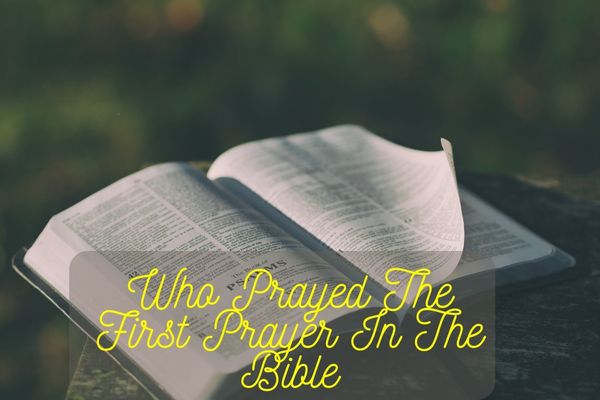Prayer holds a central place in the lives of believers, serving as a direct line of communication with the divine. It is a sacred practice that transcends time, culture, and religious boundaries. Throughout history, prayer has provided comfort, guidance, and solace to individuals in times of joy, sorrow, and uncertainty. It is an expression of faith, humility, and a deep longing for connection with God.
Who Prayed The First Prayer In The Bible
The first notable prayer in the Bible was prayed by Abraham. Prayer is a fundamental aspect of religious and spiritual practice, serving as a means to communicate, seek guidance, express gratitude, and connect with a higher power. The Bible, a sacred text revered by millions, contains numerous accounts of individuals engaging in prayer.
The First Recorded Prayers
The book of Genesis, the opening chapter of the Bible, provides insights into the earliest recorded prayers. Among the notable figures who engaged in prayer were Adam, Noah, and Abraham. While the Bible does not explicitly state who prayed the very first prayer, these individuals played significant roles in shaping the early narrative of prayer.
Adam’s Prayer: After Adam and Eve ate the forbidden fruit and realized their disobedience, they experienced shame and fear. In Genesis 3:9–10, we witness the first conversation between God and Adam, where Adam responds, “I heard you in the garden, and I was afraid because I was naked; so I hid.” Although not explicitly called a prayer, this interaction demonstrates Adam’s plea for mercy, forgiveness, and restoration of his relationship with God.
Noah’s Prayer: Moving forward, we encounter the story of Noah, chosen by God to build an ark to survive the great flood. In Genesis 8:20–22, Noah offers a sacrifice to God after leaving the ark. His act of worship and gratitude can be seen as a prayer, expressing thanksgiving and seeking God’s favour and blessing.
Abraham’s Intercession: Abraham, known as the father of faith, is a prominent figure in the Bible whose life is marked by encounters with God. In Genesis 18:22–33, we witness a remarkable exchange between Abraham and God regarding the impending destruction of Sodom and Gomorrah. Abraham boldly intercedes on behalf of the righteous people in those cities, appealing to God’s mercy and justice. This intercession can be considered a profound prayer of intercession, highlighting Abraham’s faith and his deep concern for others.
Lessons from the first prayer prayed in the bible
The first prayer mentioned in the Bible holds profound lessons that resonate through the pages of history. Found in the book of Genesis, it is the prayer of Abraham’s servant as he embarks on a mission to find a suitable wife for Abraham’s son, Isaac. Extracting lessons from this prayer provides valuable insights into faith, trust, and divine guidance.
- Specificity in Prayer
Abraham’s servant didn’t offer a vague or general prayer. Instead, he specifically outlined the qualities he sought in a potential wife for Isaac. This teaches us the importance of being clear and specific in our prayers, and articulating our desires and needs with precision.
- Dependence on Divine Guidance
The servant’s prayer reflects a deep reliance on God’s guidance. He sought a clear sign to identify the chosen bride for Isaac. This teaches us to acknowledge our dependence on divine wisdom and guidance in our decision-making processes.
- Acknowledgement of God’s Sovereignty
The servant’s prayer begins with the acknowledgement of God’s greatness and authority. Recognizing God’s sovereignty sets the foundation for a humble and reverent approach to prayer. It reminds us to start our prayers with praise and recognition of God’s majesty.
- Expectation and Faith
In his prayer, the servant expressed confidence in God’s ability to fulfil his request. This element of faith and expectation is a crucial lesson. It encourages us to approach our prayers with unwavering faith, believing that God can and will answer according to His will.
- Prompt and Direct Answers
God answered the servant’s prayer promptly and directly. This teaches us that God is attentive to our needs and is capable of providing clear answers. It emphasizes the importance of patience and trust in waiting for God’s timing.
- Gratitude in Prayer
Upon receiving a positive response, the servant didn’t forget to express gratitude. This teaches us the significance of gratitude in our prayers. Gratefulness fosters a positive and humble attitude, acknowledging God’s goodness and faithfulness.
- Alignment with God’s Will
The servant’s prayer was in alignment with God’s overall plan for Abraham’s family. This underscores the importance of praying under God’s will. It reminds us that our desires should align with God’s purpose and plan for our lives.
The servant demonstrated persistence by continuing to seek God’s guidance until he received a clear answer. This teaches us the value of persistence in our prayers. We are encouraged to persevere and keep seeking God, trusting that He hears and responds.
In extracting lessons from the first prayer in the Bible, we discover timeless principles that guide our own prayer lives. From specificity and dependence on divine guidance to gratitude and persistence, these lessons provide a blueprint for a rich and meaningful prayer life.
Comparative Analysis
Common Elements in Early Prayers Exploring the common threads woven through early prayers reveals universal themes of faith, gratitude, and the quest for guidance. These shared elements bind diverse biblical figures in their communication with the divine.
Evolution of Prayer in the Bible Tracing the evolution of prayer throughout the Bible unveils a dynamic journey. From simple inquiries to profound supplications, prayer evolved in tandem with the unfolding human-divine relationship.
Conclusion
While the Bible does not explicitly reveal who prayed the very first prayer, the accounts of Adam, Noah, and Abraham provide significant insights into the early origins of prayer. These individuals sought God’s presence, mercy, and guidance, and interceded on behalf of others. Their prayers serve as timeless examples of faith, humility, and the power of seeking a relationship with the divine.
Ultimately, the question of who prayed the first prayer in the Bible invites us to explore the profound nature of prayer itself. It reminds us of the innate human longing for connection with the divine and the enduring power of prayer as a transformative and deeply personal practice.






